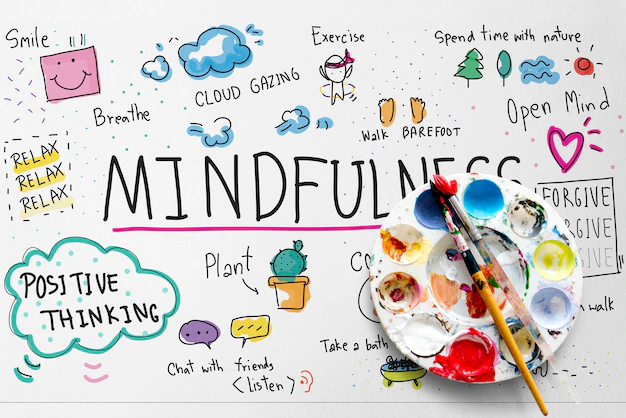Mindfulness is the practice of paying attention to the present moment. And your thoughts and feelings in a non-judgmental way. It involves bringing your attention to your breath, your body, and your surroundings. And noticing your thoughts and emotions as they arise.
Mindfulness is not about trying to change or suppress your thoughts and emotions. But rather about accepting them and letting them be. It can help you become more aware of your thoughts and feelings, and can improve your ability to manage them in a healthy way.
Benefits of mindfulness
There are many benefits to practicing mindfulness, including:
- Reducing stress and anxiety: Mindfulness can help you manage stress by helping you become more aware of your thoughts and emotions, and by teaching you techniques to cope with them in a healthy way.
- Improving mood and overall well-being: Mindfulness can help you feel more present and engaged in your life, and can improve your overall sense of well-being.
- Increasing focus and concentration: Mindfulness can help you improve your ability to pay attention and stay focused, which can be helpful in both personal and professional settings.
- Improving relationships with others: Mindfulness can help you become more aware of your own thoughts and emotions, and can also help you be more present and attentive when interacting with others.

How to practice mindfulness
There are many different ways to practice mindfulness, such as:
- Meditation: This involves sitting quietly and focusing on your breath, or using a mantra or other object of focus to help keep your mind from wandering.
- Yoga: This practice involves physical postures and breathing techniques that can help bring awareness to the present moment.
- Body scan: This involves lying down and focusing on different parts of your body, noticing any sensations or feelings that arise.
- Walking meditation: This involves paying attention to your breath and your surroundings as you walk, noticing any thoughts or emotions that come up.
You can practice mindfulness anytime, anywhere, and it does not require any special equipment or skills. It is a simple yet powerful way to improve your well-being and cultivate a sense of inner peace and balance.
Tips for getting started with mindfulness
- Start small: You don’t have to set aside a lot of time to practice mindfulness. Even just a few minutes a day can be beneficial.
- Find a comfortable and quiet place: Choose a place where you can sit or lie down comfortably and without distractions.
- Use a guided meditation or app: There are many apps and websites that offer guided mindfulness meditations to help you get started.
- Be patient and persistent: Mindfulness takes practice, and it is normal to find it challenging at first. Be patient with yourself and try to practice regularly.
- Notice, but don’t judge: When practicing mindfulness, it is important to notice your thoughts and emotions, but to do so without judging them.
By incorporating mindfulness into your daily routine, you can improve your well-being and find a sense of inner peace and balance.






